It's getting easier for companies and people to get fuel delivered right to their door as fuel delivery services change quickly.
Traditional fuel supply lines often have problems, such as routes that aren't very efficient, demand that is hard to predict, and high costs of doing business. This is where AI in fuel delivery apps is making a big effect.
With the implementation of AI in fuel delivery apps, businesses can optimize delivery paths, predict fuel demand, and reduce wastage. AI-driven fuel delivery apps study real-time data to improve speed and boost customer experience.
From distribution control to automatic dispatching, AI is transforming the business.
The use of AI in fuel apps is not just about automation; it also improves security, price, and store management. AI-powered fuel delivery apps are becoming more and more important for businesses that want faster and better fuel delivery options as technology improves.
Let’s dive into this blog and understand why AI for fuel delivery apps is a trending topic and how it is benefiting the industry.
Market Overview Of Fuel Delivery Apps
The fuel delivery industry is experiencing significant growth, driven by technological advancements and increasing demand for efficient fuel distribution solutions.
Here are five key statistics highlighting the current market landscape:
-
- Valued at USD 2.7 billion in 2023, the global fuel delivery market is projected to reach USD 4.22 billion by 2032, growing at a CAGR of 5.1% during the forecast period.
- The on-demand fuel delivery market size was USD 0.33 billion in 2024 and is expected to soar to USD 2.37 billion by 2033, exhibiting a robust CAGR of 15.97% from 2025 to 2033.
- In 2024, the mobile fuel delivery market was valued at approximately USD 5.06 billion. It is anticipated to grow to USD 8.75 billion by 2032, with a CAGR of about 7.1% during the forecast period.
- The automotive fuel delivery market is projected to expand from USD 9.76 billion in 2024 to an estimated USD 15.92 billion by 2032, reflecting a CAGR of 6.3% between 2024 and 2032.
- The Asia-Pacific region holds the largest share in the global automotive fuel delivery market, attributed to the high volume of vehicle production and sales in countries like India and China.
These figures show the dynamic growth and evolving possibilities within the fuel delivery sector, propelled by technology innovations and rising global demand. In the next section, we will see how you can use AI in different ways to create robust fuel delivery.
Key Applications of AI in Fuel Delivery Apps
The use of AI in fuel delivery apps is reshaping the industry by automating processes, increasing efficiency, reducing fuel delivery app development costs, and improving customer satisfaction.
AI-driven solutions help fuel delivery businesses improve their services, optimize supply lines, and ensure smooth fuel distribution.
Here’s a thorough look at how AI in fuel delivery services is making a difference:
1. Smart Route Optimization
One of the biggest uses of AI in fuel delivery distribution control is improving delivery paths. AI algorithms examine real-time traffic conditions, weather forecasts, road closures, and fuel station supply to determine the fastest and most efficient paths.
This lowers fuel waste, minimizes delivery delays, and ensures that customers receive their fuel on time. With AI-powered route optimization, businesses can cut down on operational costs and improve total fleet efficiency.
2. Demand Forecasting and Inventory Management
AI-powered fuel delivery apps use predictive analytics to anticipate fuel demand. By studying past data, market trends, seasonal fluctuations, and external factors like weather conditions, AI can correctly guess when and where fuel will be needed the most.
These advanced fuel delivery features help fuel companies improve inventory levels, avoid shortages, and reduce needless fuel wastage.
Businesses using AI-based inventory management can keep a steady supply chain and avoid expensive overstocking or understocking problems.
3. Automated Dispatching and Scheduling
AI in propene solution simplifies fuel dispatching by instantly giving the nearest available delivery car to a customer’s request.
The system considers multiple factors, such as driver availability, car fuel capacity, road conditions, and urgency of the order, to ensure efficient dispatching.
Automated scheduling helps fuel companies improve operations, reduce delivery times, and boost customer happiness.
4. AI-Powered Customer Insights
Understanding customer behavior is important for better fuel delivery services.
AI in fuel delivery apps gathers and analyzes user tastes, past orders, refilling frequency, and location data to provide personalized suggestions. AI-driven insights allow businesses to offer tailored deals, reward programs, and special offers based on customer needs.
Additionally, AI can guess when a customer is likely to need a refill and send proactive messages, improving user experience and retention.
5. Fraud Detection and Security Measures
Fraud and security risks are big issues in the fuel delivery business. AI-powered app security measures track transaction history, fuel usage trends, and delivery data to identify any suspect activity, such as illegal access, payment fraud, or fuel theft.
AI-driven surveillance systems and real-time reports can help companies avoid security breaches and ensure safe fuel transactions.
6. Dynamic Pricing Strategy
Fuel prices fluctuate due to different market factors such as quantity, demand, and global fuel rates.
Creating an AI app for fuel delivery helps service providers analyse real-time market conditions, competitor pricing, and customer demand to adopt a dynamic pricing strategy. This helps fuel providers to change their prices instantly and maximize profits while staying competitive.
7. Predictive Maintenance for Delivery Vehicles
Vehicle breakdowns can cause costly delays in fuel delivery. AI-powered predictive maintenance tracks engine performance, fuel economy, tyre pressure, and mechanical wear in real time.
By spotting possible issues before they lead to crashes, AI helps companies plan maintenance proactively, reduce downtime, and extend car lifespan. This ensures fast and constant fuel delivery services.
8. AI-Based Chatbots for Customer Support
Customer service is an important part of any fuel delivery business.
AI-powered chatbots in fuel delivery apps can handle common questions, help with order places, provide real-time order updates, and offer debugging support.
These chatbots work 24/7, lowering the need for human agents and ensuring instant assistance for customers. By automating customer interactions, companies can improve efficiency and increase user happiness.
9. AI for Regulatory Compliance & Reporting
The fuel delivery business is subject to strict rules regarding fuel storage, transportation, and environmental effects.
AI improves compliance management by automating report generation, tracking carbon pollution, and ensuring adherence to safety regulations.
AI-driven compliance tools help companies escape legal penalties, streamline auditing processes, and keep industry standards easily.
10. AI-Driven Supply Chain Optimization
Managing the fuel supply chain needs cooperation between fuel providers, storage sites, and delivery fleets. AI-driven solutions watch fuel stock levels, simplify shipping planning, and predict supply chain disruptions.
By improving efficiency in supply chain management, AI helps companies minimize practical delays, reduce costs, and keep a steady flow of fuel deliveries.
The implementation of AI in fuel delivery apps is revolutionizing the industry by making processes smarter, faster, and more reliable.
As AI continues to grow, its role in fuel delivery will only become more beneficial in ensuring a seamless and efficient experience for both companies and customers.
Benefits of AI in Fuel Delivery Services
Developing a fuel delivery app with AI technologies not only benefits the users but also offers several advantages to the fuel companies as well.
From automatic processes to predictive analytics, AI-powered fuel delivery apps provide several benefits that make fuel transport smarter and more reliable.
1] Faster and More Efficient Deliveries
By using AI in fuel distribution, companies can improve delivery routes using real-time traffic analysis, weather conditions, and fuel demand. This ensures that fuel gets to customers quickly and efficiently.
2] Improved Demand Forecasting
AI algorithms focus on past consumption habits, market trends, and external factors like weather to predict fuel demand correctly. This helps fuel suppliers stock supplies effectively and avoid shortages.
3] Cost Reduction in Operations
AI in fuel delivery apps simplifies scheduling, dispatching, and stocking management, lowering the need for human involvement.
This not only minimizes labor costs and improves worker output but also optimizes AI app development costs by enhancing efficiency and reducing resource wastage.
4] Enhanced Customer Experience
With AI-driven fuel delivery apps, customers get personalized suggestions, timely refill alerts, and dynamic prices based on their usage habits. AI-powered apps also provide 24/7 help for order tracking and support.
5] Better Security and Fraud Prevention
Artificial intelligence in fuel delivery apps helps discover fraudulent activities by tracking fuel transactions, watching delivery cars, and finding odd fuel consumption trends.
AI-enabled monitoring stops theft and unauthorized entry.
6] Dynamic Pricing for Competitive Advantage
Fuel prices vary based on market factors. AI uses real-time data analysis to change prices flexibly, ensuring the existing monetization strategies stay competitive while maximizing income.
7] Predictive Maintenance for Delivery Vehicles
AI watches the health of fuel delivery trucks in real-time and suggests when maintenance is needed. This helps avoid unexpected problems, lowering downtime.
8] Compliance and Environmental Benefits
AI helps in regulatory compliance by tracking carbon emissions, creating automated reports, and ensuring safety standards in AI for fuel delivery operations.
The implementation of AI in fuel delivery apps is making the industry more efficient, safe, and customer-friendly. As technology improves, the adoption of AI-powered fuel delivery apps will continue to grow, changing the future of fuel distribution.
How Businesses Can Leverage AI for Fuel Delivery Success?
The implementation of AI in fuel delivery apps is transforming how companies work, making fuel distribution more efficient, cost-effective, and customer-centric.
By combining advanced AI-driven technologies, you can start a fuel delivery business to simplify processes and improve overall service quality.
Here’s how businesses can leverage AI in fuel delivery apps to achieve success.
A] AI-Powered Route Optimization
One of the biggest challenges in fuel delivery is ensuring timely supplies while minimizing costs. AI in fuel distribution control helps companies study traffic patterns, weather conditions, and road restrictions to find the most efficient routes for fuel transfer.
B] Smart Demand Forecasting
Understanding fuel demand changes is important for inventory management and delivery plans. AI-powered fuel delivery apps use machine learning to study previous fuel usage, seasonal trends, and external factors such as economic shifts and weather changes.
C] Automated Scheduling & Dispatching
AI powered mobile app ideas simplify dispatching and scheduling by instantly assigning delivery jobs to drivers based on real-time availability and location. This lowers human intervention and improves efficiency in AI-driven delivery apps.
D] AI-Driven Dynamic Pricing
Fuel costs are highly volatile, and companies must stay competitive while increasing profit margins.
AI in fuel delivery apps helps companies adopt dynamic pricing strategies by analyzing market trends, fuel demand, and competitor pricing in real time.
E] AI-Based Customer Personalization
To create a mobile app that offers personalized experiences helps businesses keep customers.
AI in fuel apps allows businesses to offer personalized discounts, fuel refill reminders, and loyalty awards based on user behavior and preferences.
F] Predictive Maintenance for Fleet Management
Vehicle downtime can greatly affect fuel delivery operations. AI in fuel delivery services helps track car health and predict maintenance needs before breakdowns occur.
G] Fraud Detection and Security Enhancement
Fuel theft and fraud are regular issues in fuel delivery. AI-powered fuel delivery apps use data analytics to track fuel purchases, monitor driver behavior, and identify suspicious activities.
Partnering with an experienced AI app development company ensures advanced security features and real-time monitoring to prevent fraud effectively.
AI-driven security measures help prevent unauthorized fuel entry and ensure compliance with safety laws.
H] AI-Backed Regulatory Compliance and Environmental Monitoring
Government regulations require companies to stick to safety and environmental standards. Artificial intelligence in fuel delivery apps helps handle compliance reports, track fuel emissions, and ensure adherence to industry standards.
Now, we are well-informed about the applications, benefits, and leveraging the power of AI in fuel delivery services. Let’s move further to learn about the future of AI in gas and fuel delivery apps.
Future of AI in the Fuel Delivery Industry
The future of AI in fuel delivery services is transforming how fuel is stored, transported, and delivered.
Here are some key fuel delivery app trends that will shape the industry:
-
- Autonomous Fuel Delivery Vehicles & Drones: AI-powered self-driving fuel trucks and drones may soon become a reality, reducing the need for human intervention and enabling faster, safer deliveries.
- AI-Integrated IoT for Smart Fuel Management: Smart fuel tanks and vehicles equipped with IoT sensors will track fuel levels in real time. AI in fuel delivery apps will analyze this data to predict refueling needs and ensure timely deliveries.
- Enhanced Fuel Distribution Control: With AI in fuel distribution control, businesses can optimize routes, reduce fuel wastage, and improve overall logistics management.
- Predictive Maintenance for Fuel Trucks: AI-powered predictive analytics will monitor vehicle health, detect potential issues before breakdowns occur, and schedule maintenance to reduce downtime.
- Eco-Friendly and Regulatory Compliance Solutions: AI-driven fuel delivery apps will ensure adherence to environmental regulations by optimizing fuel consumption and minimizing carbon emissions.
- Improved Safety Measures: AI will enhance safety by detecting hazardous conditions, monitoring fuel leaks, and ensuring compliance with safety protocols.
- Personalized Customer Experience: AI in top fuel apps will analyze customer preferences, predict fuel demands, and offer personalized discounts or delivery schedules for a better user experience.
By leveraging AI in gas and fuel delivery apps, businesses can improve efficiency, reduce mobile app development costs, and provide smarter fuel delivery solutions to their customers.
Get an AI-powered Fuel Delivery App With JPLoft
Looking to build a smart, AI-driven fuel delivery app?
JPLoft has the expertise to turn your vision into reality. Our team specializes in creating AI-powered fuel delivery apps that enhance operational efficiency, optimize fuel distribution, and improve customer satisfaction.
As a leading Fuel Delivery App Development Company, we integrate AI-driven features like route optimization, real-time tracking, predictive analytics, and automated dispatch to ensure smooth fuel delivery.
If you need a custom solution for fleet management or an on-demand fuel delivery platform, we tailor our services to meet your business needs.
Partner with JPLoft to develop a cutting-edge fuel delivery app that keeps you ahead of the competition. Get in touch today to revolutionize your fuel delivery operations with AI!
Wrapping Up
The integration of AI in fuel delivery services is a game-changer, giving improved speed, safety, and cost-effectiveness.
From optimizing delivery routes to better product management, AI technologies are transforming the business. By adopting AI-driven solutions, fuel delivery companies can improve operations, reduce waste, and ensure timely supplies, all while providing a better experience for customers.
As AI continues to evolve, its potential to change the fuel delivery scene will only grow, paving the way for a more innovative, sustainable, and competitive future. Businesses that harness these improvements now will be well-positioned to lead the way in an AI-powered fuel delivery industry.
FAQs
AI is used in fuel delivery for route optimization, demand forecasting, predictive maintenance, automated dispatching, and real-time monitoring. It helps businesses enhance efficiency and reduce operational costs.
AI improves delivery speed, reduces fuel wastage, enhances safety, minimizes downtime through predictive maintenance, and optimizes overall business operations.
Yes, AI-driven route optimization and demand forecasting help reduce unnecessary fuel consumption, lower operational expenses, and improve resource utilization.
Businesses can adopt AI-powered software for logistics, invest in predictive analytics tools, use IoT-based tracking systems, and integrate AI-driven customer service chatbots.
Yes, AI enhances safety by predicting maintenance issues, monitoring hazardous conditions, and ensuring compliance with industry regulations through automated systems.
AI will continue to evolve with advancements in autonomous delivery, smart fuel stations, real-time monitoring, and automated dispatching, making fuel delivery faster, safer, and more efficient.
Absolutely! AI helps businesses of all sizes by reducing costs, improving efficiency, and offering data-driven insights to optimize operations, even with limited resources.





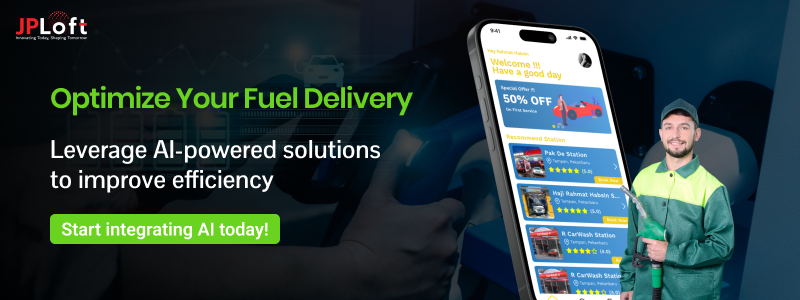
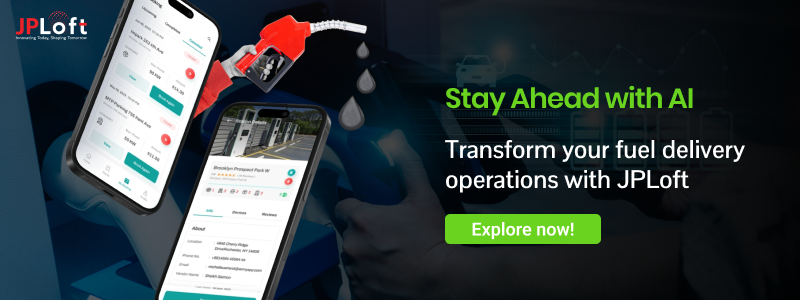

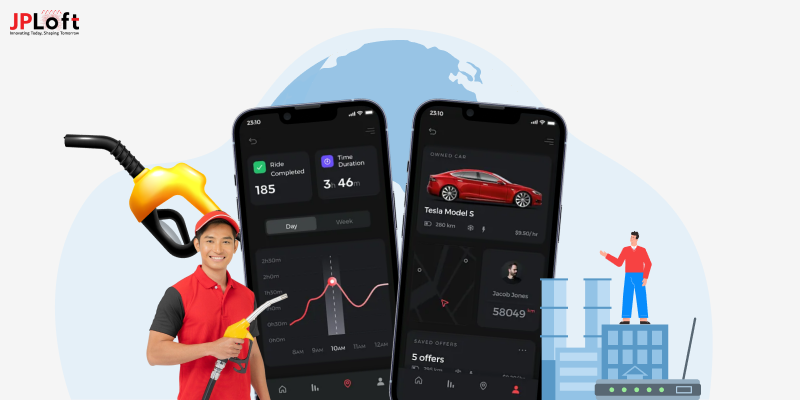
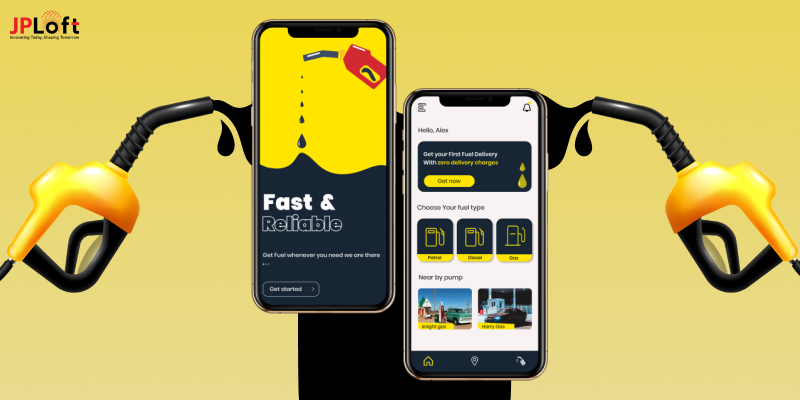
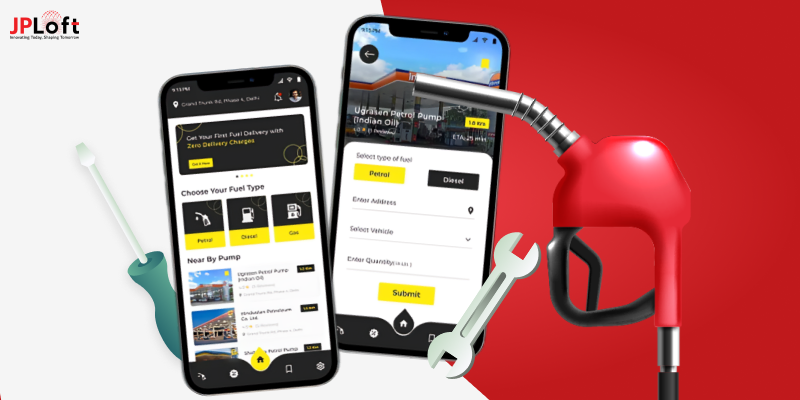



Share this blog